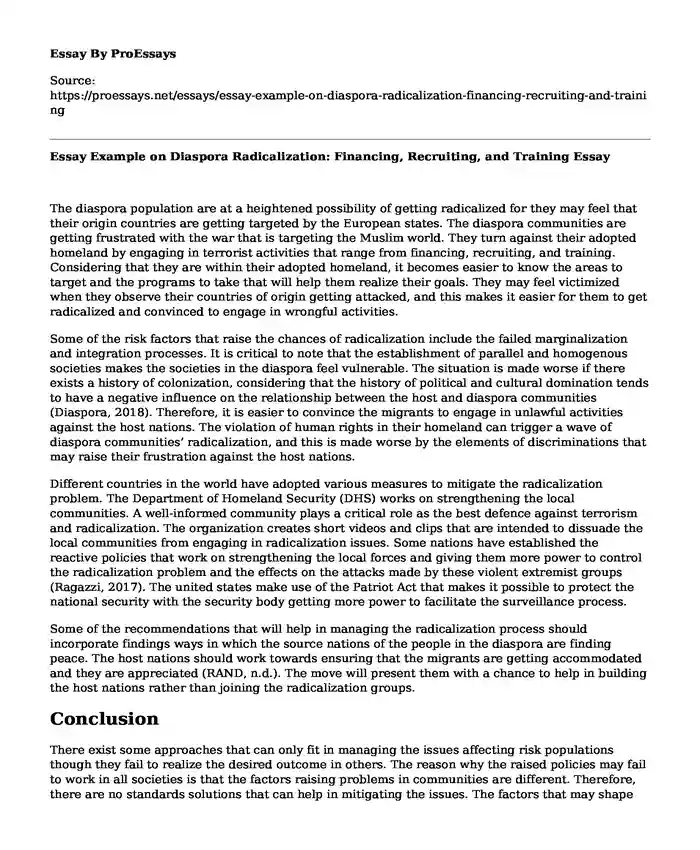The diaspora population are at a heightened possibility of getting radicalized for they may feel that their origin countries are getting targeted by the European states. The diaspora communities are getting frustrated with the war that is targeting the Muslim world. They turn against their adopted homeland by engaging in terrorist activities that range from financing, recruiting, and training. Considering that they are within their adopted homeland, it becomes easier to know the areas to target and the programs to take that will help them realize their goals. They may feel victimized when they observe their countries of origin getting attacked, and this makes it easier for them to get radicalized and convinced to engage in wrongful activities.
Some of the risk factors that raise the chances of radicalization include the failed marginalization and integration processes. It is critical to note that the establishment of parallel and homogenous societies makes the societies in the diaspora feel vulnerable. The situation is made worse if there exists a history of colonization, considering that the history of political and cultural domination tends to have a negative influence on the relationship between the host and diaspora communities (Diaspora, 2018). Therefore, it is easier to convince the migrants to engage in unlawful activities against the host nations. The violation of human rights in their homeland can trigger a wave of diaspora communities’ radicalization, and this is made worse by the elements of discriminations that may raise their frustration against the host nations.
Different countries in the world have adopted various measures to mitigate the radicalization problem. The Department of Homeland Security (DHS) works on strengthening the local communities. A well-informed community plays a critical role as the best defence against terrorism and radicalization. The organization creates short videos and clips that are intended to dissuade the local communities from engaging in radicalization issues. Some nations have established the reactive policies that work on strengthening the local forces and giving them more power to control the radicalization problem and the effects on the attacks made by these violent extremist groups (Ragazzi, 2017). The united states make use of the Patriot Act that makes it possible to protect the national security with the security body getting more power to facilitate the surveillance process.
Some of the recommendations that will help in managing the radicalization process should incorporate findings ways in which the source nations of the people in the diaspora are finding peace. The host nations should work towards ensuring that the migrants are getting accommodated and they are appreciated (RAND, n.d.). The move will present them with a chance to help in building the host nations rather than joining the radicalization groups.
Conclusion
There exist some approaches that can only fit in managing the issues affecting risk populations though they fail to realize the desired outcome in others. The reason why the raised policies may fail to work in all societies is that the factors raising problems in communities are different. Therefore, there are no standards solutions that can help in mitigating the issues. The factors that may shape the worldview of the diaspora population include ensuring that human rights are observed. People should be treated the same way irrespective of their country of origin (Waldmann, 2010). Additionally, the host nations should work on establishing security and peace in the source nations. These factors will enable the diaspora communities to feel appreciated, and they will avoid engaging in violent extremist groups.
References
Diaspora. (2018).In, Dictionary.com. Retrieved from HYPERLINK "https://www/" https://www.dictionary.com/ browse/diaspora
Ragazzi, F. (2017). Countering terrorism and radicalisation: Securitising social policy?. Critical Social Policy, 37(2), 163-179. https://doi.org/10.1177/0261018316683472
RAND. (n.d.). National Security Research Division. Retrieved from https://www.rand.org/nsrd.html
Waldmann, P.K. (2010, March 15). Radicalisation in the Diaspora: Why Muslims in the West Attack Their Host Countries (WP). Retrieved from http://www.realinstitutoelcano.org/wps/portal/rielcano_en/contenido?WCM_GLOBAL_CONTEXT=/elcano/elcano_in/zonas_in/international+terrorism/dt9-2010
Cite this page
Essay Example on Diaspora Radicalization: Financing, Recruiting, and Training. (2023, Sep 19). Retrieved from https://proessays.net/essays/essay-example-on-diaspora-radicalization-financing-recruiting-and-training
If you are the original author of this essay and no longer wish to have it published on the ProEssays website, please click below to request its removal:
- Article Review: Developing a Spiritual Assessment Toolbox
- Parental Involvement and Students' Academic Achievement Paper Example
- Essay Example on Perceived Social Isolation and Loneliness: Unrequited Love to Rejection
- Essay on Caring for Adolescents and Young Adults: Addressing Risks With Therapeutic Interventions
- Essay on Competent Nurse: Core Values for Successful Career Path
- Essay on Visual Communication: Leveraging Images for Effective Information Transfer
- Essay Example on How Creditable, Thoughtful Research Can Benefit All Areas of Society







